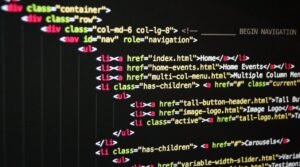AI Policy Issues
Artificial Intelligence (AI) has become a prominent and transformative technology, raising several policy concerns requiring careful consideration. As AI systems become more pervasive and sophisticated, it is crucial to address the ethical, legal, and societal implications. This article explores some key AI policy issues that policymakers and stakeholders must grapple with to navigate this rapidly evolving landscape.
Key Takeaways
- AI Policy Issues: Addressing the ethical, legal, and societal implications of AI is crucial.
- Rapid Evolution: AI is a rapidly evolving field that constantly introduces new challenges and policy considerations.
- Multifaceted Approach: Policymakers need to adopt a multifaceted approach to address the complexity of AI policy issues.
1. Ethical Considerations
The development and deployment of AI technologies raise significant ethical considerations, such as ensuring transparency, fairness, and accountability in AI decision-making processes. *AI systems can have biases embedded in their algorithms, leading to potential discrimination or unethical outcomes.* Policymakers need to establish guidelines and regulations to mitigate these risks and promote ethical AI practices in both the public and private sectors.
2. Legal Frameworks
Adapting existing legal frameworks to encompass the unique challenges posed by AI is essential. *The rapid advancement of AI technology often outpaces the development of corresponding regulations, creating a legal void.* Policymakers should work towards establishing clear legal frameworks that address issues such as liability, privacy, and intellectual property rights. This will provide clarity and ensure that AI systems operate within legal boundaries.
3. Labor Disruption
AI has the potential to disrupt the workforce by automating tasks traditionally done by humans. While this can lead to increased productivity and efficiency, policymakers must address the potential impact on jobs and workers. *Ensuring a just transition for workers affected by AI-driven automation is essential to mitigate social and economic disparities.* Policymakers can explore initiatives such as reskilling programs and establishing safety nets to support those affected by job displacement.
4. Data Governance
Data governance plays a critical role in AI policy. Policymakers need to balance the need for data access and utilization with privacy concerns. *Determining data ownership, ensuring informed consent, and safeguarding personal information are crucial elements of effective data governance.* Striking the right balance will facilitate innovation while protecting individuals’ privacy and preventing misuse of data.
| Policy Challenge | Description |
|---|---|
| Algorithmic Bias | Addressing biases in AI algorithms to prevent discriminatory outcomes. |
| Liability Frameworks | Determining liability when AI systems cause harm or make incorrect decisions. |
| Data Privacy | Ensuring adequate protection of personal data while fostering data-driven innovation. |
5. International Cooperation
AI policy issues extend beyond national boundaries, necessitating international cooperation and coordination. *Collaboration among countries can facilitate the exchange of best practices, harmonize regulations, and address global challenges together.* Policymakers should engage in forums and initiatives to establish a cooperative framework ensuring responsible AI development and deployment.
| Initiative | Description |
|---|---|
| The Global Partnership on AI | A multi-stakeholder platform to guide AI policy, sharing research and recommendations. |
| The OECD AI Principles | A set of guidelines focusing on integrity, transparency, and accountability of AI systems. |
| The EU’s AI Regulation Proposal | A comprehensive regulatory framework addressing AI risk assessment, transparency, and accountability. |
6. Public Trust and Awareness
Building public trust in AI technologies is crucial for their widespread adoption and acceptance. Policymakers should focus on fostering transparency and increased public awareness of AI systems and their impacts. *Ensuring meaningful engagement with the public and promoting responsible AI deployments can help mitigate concerns and promote public trust in AI applications.* Education and awareness campaigns can play a vital role in achieving this goal.
7. Human Rights and AI
AI systems have the potential to impact human rights, such as privacy, freedom of expression, and non-discrimination. *Policymakers need to ensure that AI technologies respect and protect fundamental human rights.* Establishing guidelines and accountability mechanisms to prevent AI-related violations is imperative for creating a human-centric approach to AI policy.
| Human Right | AI Implications |
|---|---|
| Privacy | AI systems can collect and analyze personal data, raising privacy concerns. |
| Freedom of Expression | AI algorithms can influence content dissemination, raising concerns regarding censorship and bias. |
| Non-Discrimination | AI can perpetuate biases or discriminate against certain groups, requiring safeguards and mitigation strategies. |
AI policy issues present complex challenges that require ongoing attention and adaptation. Policymakers, researchers, and stakeholders must actively engage in shaping AI policies that promote ethical, responsible, and inclusive AI development and deployment. By considering these policy issues and working towards effective solutions, we can harness the potential of AI while ensuring its benefits are accessible to all.

Common Misconceptions
Misconception 1: AI will fully replace human jobs
One of the most common misconceptions about AI policy issues is that artificial intelligence will entirely replace human jobs. While it is true that AI has the potential to automate certain tasks, it is unlikely to completely replace human workers.
- AI is more likely to augment human capabilities rather than replace them.
- Jobs that require empathy, creativity, and complex problem-solving are less likely to be fully automated by AI.
- AI is more effective when used in collaboration with humans, rather than as a standalone resource.
Misconception 2: AI is infallible and unbiased
Another common misconception is that AI systems are infallible and unbiased. However, AI technologies are not immune to errors and bias, as they are ultimately developed and trained by humans.
- AI systems can be biased if they are trained on data that is itself biased.
- Bias in AI can perpetuate discrimination and reinforce societal inequalities.
- Robust AI policy frameworks are needed to address bias and ensure fairness in AI technologies.
Misconception 3: AI policy issues only concern technology experts
Many people mistakenly believe that AI policy issues are only relevant to technology experts and are not relevant or accessible to the general public. However, AI policy issues have far-reaching societal implications and affect various aspects of our lives.
- AI policy issues have implications for privacy, security, and ethical considerations.
- Policy decisions around AI impact job markets, education, and economic stability.
- Public engagement and awareness are crucial for shaping responsible AI policy.
Misconception 4: AI will solve all societal problems
Some individuals hold the misconception that AI will be a panacea for all societal problems, ranging from healthcare to climate change. However, AI is not a magic bullet and cannot single-handedly address all complex challenges we face.
- AI tools are only as good as the quality and relevance of the data they are trained on.
- Social, cultural, and political factors must also be considered when addressing societal challenges.
- A holistic approach, combining AI with other strategies, is needed for effective problem-solving.
Misconception 5: AI policy is a fixed, one-size-fits-all solution
Lastly, some individuals wrongly assume that AI policy is a fixed, one-size-fits-all solution. However, AI policy is a dynamic and evolving field that requires adaptability and continuous evaluation.
- AI policy needs to consider the rapid pace of technological advancements and adapt accordingly.
- Policy frameworks should be flexible and iterative to accommodate emerging risks and challenges.
- Collaboration between policymakers, researchers, and industry experts is crucial for effective AI policy implementation.

AI Policy Issues: A Comprehensive Overview
Artificial Intelligence (AI) has rapidly advanced in recent years, presenting both exciting opportunities and pressing challenges. This article explores several policy issues surrounding AI, ranging from data privacy and security to algorithmic bias and transparency. Each table below provides key insights into a specific aspect of AI policy, shedding light on the complexities and urgency of addressing these issues.
Data Privacy and Security Regulations
In today’s data-driven world, ensuring privacy and security in AI applications is of paramount importance. The table below outlines various legal and regulatory frameworks implemented by governments worldwide.
| Country | Data Privacy Regulation | Data Security Regulation |
| ————– | —————————— | ————————— |
| United States | General Data Protection Regulation (GDPR) | Federal Trade Commission Act |
| European Union | California Consumer Privacy Act (CCPA) | National Cybersecurity Strategy |
| Japan | Personal Information Protection Act | Cybersecurity Basic Act |
| India | Personal Data Protection Bill | Information Technology (IT) Act |
Algorithmic Bias and Fairness
The pervasiveness of machine learning algorithms creates concerns surrounding algorithmic bias and the need for fairness in AI systems. The following table presents notable cases of algorithmic bias across various sectors.
| Sector | Notable Cases of Algorithmic Bias |
| ——————— | ————————————————– |
| Criminal Justice | COMPAS algorithm used for recidivism prediction |
| Employment | Amazon’s gender-biased recruiting algorithm |
| Credit Scoring | Apple Card’s gender-based credit limit discrepancies |
| Facial Recognition | Racial biases in facial recognition systems |
| Healthcare | Bias in algorithms used for triage recommendations |
Ethics in AI Development
Developing AI that aligns with ethical principles is crucial for its responsible and beneficial deployment. The following table highlights key ethical guidelines for AI development established by leading organizations.
| Organization | Ethical Guidelines |
| ————————— | ——————————————————- |
| Partnership on AI | Fairness, transparency, accountability, and inclusivity |
| IEEE Global Initiative on AI | Accountability, transparency, and non-maleficence |
| OpenAI | Broadly distributed benefits and long-term safety |
| European Commission | Human agency and oversight, transparency, and privacy |
| United Nations | Ethical use, transparency, and accountability |
Public Opinion on AI
Understanding public perception and attitudes towards AI is crucial to shape effective policy decisions. The table below depicts the sentiments of individuals based on recent surveys.
| Sentiment | Percentage of Individuals |
| ————- | —————————— |
| Positive | 53% |
| Neutral | 31% |
| Negative | 16% |
Education and AI Workforce
Promoting education and enhancing the AI workforce are integral to capitalize on the benefits of AI. The table provides an overview of initiatives and programs aimed at equipping individuals with AI-related skills.
| Initiative | Description |
| ——————— | —————————————————————————— |
| AI for Education | Integrating AI technologies into educational curricula and learning materials |
| AI Apprenticeships | Apprenticeship programs to develop practical AI skills and knowledge |
| AI Research Grants | Funding research projects focused on AI advancements and societal implications |
| AI Talent Development | Workshops, seminars, and boot camps for upskilling and reskilling the workforce |
International Collaboration
Addressing AI policy issues requires international collaboration and cooperation. The following table highlights key multilateral initiatives focused on AI governance.
| Initiative | Participating Countries |
| ——————————– | ——————————————————————- |
| Global Partnership on AI (GPAI) | USA, Canada, EU, UK, Japan, Australia, France, Germany, India |
| OECD AI Principles | 46 member countries, including the US, UK, Germany, Japan, and Sweden|
| Copenhagen AI Declaration | Denmark, Estonia, Finland, Iceland, Latvia, Lithuania, and Norway |
| G7 AI Agreement | Japan, USA, Canada, France, Germany, Italy, and UK |
Transparency in AI Systems
Ensuring transparency in AI systems promotes accountability and builds user trust. The table below showcases regulatory efforts and organizations striving for transparent AI.
| Efforts | Description |
| ————————– | —————————————————— |
| Algorithmic Impact Assessments | Evaluating potential biases or adverse impacts |
| AI Now Institute | Research institute focused on AI accountability |
| Algorithmic Transparency | Providing explanations for algorithmic decision-making |
| Right to Explanation | User entitlement to understand algorithmic outcomes |
| European Artificial Intelligence Board | Creating guidelines for trustworthy AI |
AI and Employment Disruption
The impact of AI on future job markets and employment is a topic of concern. The following table illustrates projected effects of AI automation on various industries.
| Industry | Percentage of Jobs at Risk |
| ——————– | ————————- |
| Transport and Storage| 79% |
| Manufacturing | 73% |
| Financial Services | 48% |
| Wholesale and Retail | 44% |
| Accommodation and Food Services | 37% |
AI in Healthcare
The integration of AI in healthcare holds tremendous potential, but it must be thoroughly regulated. The table below outlines key applications of AI in healthcare and associated challenges.
| AI Application | Challenge |
| —————————— | ——————————————————- |
| Medical Diagnostics | Ensuring accuracy, making unbiased decisions |
| Drug Discovery | Controlling risks, ensuring safety |
| Patient Monitoring | Protecting privacy, algorithmic reliability |
| Precision Medicine | Interpreting outcomes, addressing ethical concerns |
| Telemedicine and AI Chatbots | Ensuring accessibility, reducing healthcare disparities |
From data privacy regulations to the ethics of AI development, this article has touched upon a myriad of AI policy issues. It is crucial for governments, organizations, and citizens to collaboratively address these concerns to reap the benefits of AI while mitigating potential risks. By addressing AI policy issues in a comprehensive and inclusive manner, we can harness the transformative power of AI for the betterment of society.
Frequently Asked Questions
What is AI policy?
AI policy refers to the set of rules, regulations, and guidelines established by governments and organizations to govern the development, deployment, and use of artificial intelligence technologies.
Why is AI policy important?
AI policy is crucial in ensuring that artificial intelligence technologies are developed and used ethically, considering their potential social, economic, and legal implications. It helps prevent misuse, protect individual rights, and promote responsible AI innovation.
What are some key AI policy issues?
Some key AI policy issues include privacy and data protection, algorithmic bias and discrimination, accountability and transparency in AI systems, employment and labor market implications, intellectual property rights, and AI governance at the international level.
What is algorithmic bias and why is it a concern?
Algorithmic bias refers to the unfair or discriminatory outcomes produced by AI systems due to inherent biases in the training data or algorithms. It can result in discriminatory practices in areas such as hiring, lending, and law enforcement, and raise concerns about fairness and social justice.
How can AI policy address algorithmic bias?
AI policy can address algorithmic bias by promoting diversity and inclusivity in AI research and development, establishing standards and guidelines for unbiased training data and algorithmic methodologies, and requiring transparency and accountability in AI systems to detect and mitigate biases.
What are the privacy concerns related to AI?
AI raises privacy concerns as it involves collecting and analyzing massive amounts of personal data. There is a risk of unauthorized access, misuse, and abuse of personal information, leading to privacy breaches and violations of individuals’ rights. AI policy can ensure proper data protection and privacy safeguards.
How does AI policy impact the job market?
AI policy has implications for the job market, as the automation and adoption of AI technologies may lead to job displacement in certain sectors. It is necessary to address the reskilling and upskilling needs of workers, facilitate smooth transitions, and create new employment opportunities in the AI-driven economy.
What is AI governance at the international level?
AI governance at the international level involves coordination and cooperation among countries to establish frameworks and agreements guiding the responsible development and use of AI technologies. It encompasses issues such as data sharing, ethical standards, and ensuring global collaboration while addressing AI’s global challenges.
How can AI policy promote transparency and accountability?
AI policy can promote transparency and accountability by requiring organizations to disclose information about the AI systems they deploy and the data used, ensuring understandable explanations of AI-generated decisions, establishing independent auditing mechanisms, and enforcing legal and ethical standards.
What role can individuals and organizations play in AI policy development?
Individuals and organizations can contribute to AI policy development by engaging in public discourse, participating in consultations and policy-making processes, conducting research on AI policy issues, advocating for ethical AI development, and complying with the regulations and guidelines set by AI policies.




